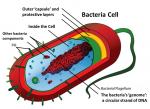|
This section contains 1,446 words (approx. 5 pages at 300 words per page) |

|
Bacteria are one-celled organisms that lack a nucleus defined by a nuclear membrane and the organelles that are associated with eukaryotic cells. Bacteria are prokaryotes that maintain their genetic material, DNA, in a long circular molecule. Bacteria also contain DNA in small circular molecules termed plasmids.
Bacteria (singular, bacterium) are organisms that are larger and more organized than viruses. Although the direct detection of bacteria requires the use of a microscope or specialized tests, bacteria are large in number and variety. Bacteria flourish in every possible habitat, as well as on and within the bodies of living things. Scientists utilize their knowledge of bacterial genetics and the techniques of bacterial genetic engineering to produce important medical and industrial substances, including human insulin, interferon, and other proteins.
With the invention of the powerful electron microscope, bacterial cells have been studied in great detail. They occur in three basic shapes...
|
This section contains 1,446 words (approx. 5 pages at 300 words per page) |

|


